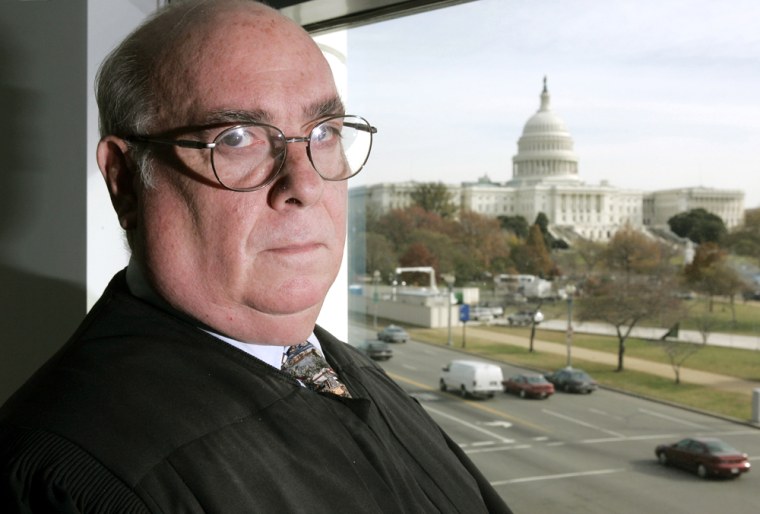The federal government won a major victory Tuesday in the class action suit surrounding the Indian Trust Fund, as an appeals court ordered the removal of a judge who had repeatedly vowed to expose a cabinet-level agency whose "spite" he said, has led it to turn its "wrath" on trust beneficiaries and engage in "willful misconduct," "iniquities," "scandals," "dirty tricks," and "outright villainy."
The battle of the Indian Trust Fund has been going on unofficially for more than a century. But 10 years ago Eloise Cobell of Browning, Mont., an Indian land owner, formally started the class action suit against the government. The Interior Department manages her property and that of about 240,000 other Indians leasing the oil, timber, mining and grazing rights, collecting the money in trusts and distributing it to the owners. Cobell contends the government owes Indians $27 billion.
In Tuesday's ruling, the U.S. Court of Appeals for the District of Columbia Circuit, siding with the government, removed U.S. District Judge Royce Lamberth — finding that Lamberth had lost his objectivity. "We conclude, reluctantly, that this is one of those rare cases in which reassignment is necessary," the judges wrote.
‘Opportunity for a fresh start’
The court ordered the case reassigned to another judge. The Appeals Court said, "Our ruling today presents an opportunity for a fresh start... We expect both parties to work with the new judge to resolve this case expeditiously and fairly."
Repeated federal reports have exposed corruption and mismanagement in the Indian Trust system; no one has ever attempted a complete accounting. The battle entered federal court in 1996 when Cobell, a Blackfoot Indian from Montana, asked the court to find out what no one else could. She asked, `How much money has the government earned on tribal lands from leases for oil and mineral and timber and grazing?' By law, that money is meant for the Indian Trust Fund.
But the Appeals Court concluded that Lamberth went too far. "On several occasions the district court or its appointees exceeded the role of impartial arbiter," the court ruled. The court also decided that Lamberth believed that racism at Interior continued and that the department is "a dinosaur — the morally and culturally oblivious hand-me-down of a disgracefully racist and imperialist government that should have been buried a century ago, the last pathetic outpost of the indifference and anglocentrism we thought we had left behind."
Recognizing harm done to Indian tribes by the mismanagement of the trust fund, the appeals court wrote, "this case serves as an appalling reminder of the evils that result when large numbers of the politically powerless are placed at the mercy of institutions engendered and controlled by a politically powerful few. It reminds us that even today our great democratic enterprise remains unfinished. And it reminds us, finally, that the terrible power of government, and the frailty of the restraints on the exercise of that power, are never fully revealed until government turns against the people."
Plaintiff's statement
In a statement Tuesday, Cobell said, "We are disappointed that the Indian Trust case has been reassigned because this will end the truly heroic efforts of a sincere and devoted jurist, the Honorable Royce C. Lamberth, to remedy the century of abuse of Indian people by the Department of Interior. That abuse continues to this day."
But Cobell said the removal decision provides a clear new mandate to resolve this matter, "We agree with the court's suggestion that this litigation has gone on too long. We have attempted to resolve the case out of court and we are continuing to do so."
In its ruling the Appeals Court also issued a warning to the government, that is has, "an obligation to rise above its deplorable record and help fashion an effective remedy."
The chief judge of the District Court, Thomas Hogan will now have to appoint a new judge to hear this case.
